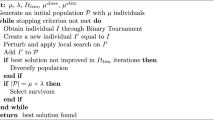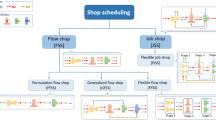Abstract
We consider a single-machine scheduling problem with deteriorating jobs in which the due dates are determined by the equal slack method. In this model, the processing time of a job is defined as a simple linear function of its starting time. The objective is to minimize the total weighted earliness penalty subject to no tardy jobs. We prove that two special cases of the problem remain polynomially solvable. The first case is the problem with equally weighted monotonous penalty objective function and the other case is the problem with weighted linear penalty objective function.
Similar content being viewed by others
References
Alidaee B, Womer NK (1999) Scheduling with time dependent processing times: review and extensions. J Oper Res Soc 50:711–720
Cheng TCE, Ding Q, Lin BMT (2004) A concise survey of scheduling with time-dependent processing times. Eur J Oper Res 152:1–13
Wang J-B, Xia Z-Q (2005) Scheduling jobs under decreasing linear deterioration. Inf Process Lett 94:63–69
Wang J-B, Xia Z-Q (2006) Flow shop scheduling with deteriorating jobs under dominating machines. Omega 34:327–336
Wang J-B, Xia Z-Q (2006) Flow shop scheduling problems with deteriorating jobs under dominating machines. J Oper Res Soc 57:220–226
Gawiejnowicz S, Kurc W, Pankowska L (2006) Pareto and scalar bicriterion optimization in scheduling deteriorating jobs. Comput Oper Res 33:746–767
Wang J-B, Ng CT, Cheng TCE, Liu LL (2006) Minimizing total completion time in a two-machine flow shop with deteriorating jobs. Appl Math Comput 180:185–193
Wang J-B (2007) Flow shop scheduling problems with decreasing linear deterioration under dominating machines. Comput Oper Res 34:2043–2058
Gawiejnowicz S (2007) Scheduling deteriorating jobs subject to job or machine availability constraints. Eur J Oper Res 180:472–478
Wang J-B, Ng CT, Cheng TCE (2008) Single-machine scheduling with deteriorating jobs under a series-parallel graph constraint. Comput Oper Res 35:2684–2693
Leung JYT, Ng CT, Cheng TCE (2008) Minimizing sum of completion times for batch scheduling of jobs with deteriorating processing times. Eur J Oper Res 187:1090–1099
Wang J-B, Lin L, Shan F (2008) Single-machine group scheduling problems with deteriorating jobs. Int J Adv Manuf Technol 39:808–812
Toksar MD, Guner E (2008) Minimizing the earliness/tardiness costs on parallel machine with learning effects and deteriorating jobs: a mixed nonlinear integer programming approach. Int J Adv Manuf Technol 38:801–808
Wang J-B, Jiang Y, Wang G (2009) Single-machine scheduling with past-sequence-dependent setup times and effects of deterioration and learning. Int J Adv Manuf Technol 41:1221–1226
Wang J-B, Wang L-Y, Wang D, Wang X-Y (2008) Single machine scheduling with a time-dependent deterioration. Int J Adv Manuf Technol. doi:10.1007/s00170-008-1760-6
Cheng TCE, Kang LY, Ng CT (2004) Due-date assignment and single machine scheduling with deteriorating jobs. J Oper Res Soc 55:198–203
Cheng TCE, Kang LY, Ng CT (2005) Single machine due-date scheduling of jobs with decreasing start-time dependent processing times. Int Trans Oper Res 12:355–366
Oron D (2008) Single machine scheduling with simple linear deterioration to minimize total absolute deviation of completion times. Comput Oper Res 35:2071–2078
Chang S, Schneeberger H (1988) Single machine scheduling to minimize weighted earliness subject to no tardy jobs. Eur J Oper Res 34:221–230
Qi X, Tu F-S (1998) Scheduling a single machine to minimize earliness penalties subject to the SLK due-date determination method. Eur J Oper Res 105:502–508
Gordon VS, Strusevich VA (1999) Earliness penalties on a single machine subject to precedence constraints: SLK due date assignment. Comput Oper Res 26:157–177
Pathumnakul S, Egbelu PJ (2005) Algorithm for minimizing weighted earliness penalty in single-machine problem. Eur J Oper Res 161:780–796
Mosheiov G (1994) Scheduling jobs under simple linear deterioration. Comput Oper Res 21:653–659
Graham RL, Lawler EL, Lenstra JK, Rinnooy Kan AHG (1979) Optimization and approximation in deterministic sequencing and scheduling: a survey. Ann Discrete Math 5:287–326
Author information
Authors and Affiliations
Corresponding author
Rights and permissions
About this article
Cite this article
Wang, D., Wang, JB. Single-machine scheduling with simple linear deterioration to minimize earliness penalties. Int J Adv Manuf Technol 46, 285–290 (2010). https://doi.org/10.1007/s00170-009-2086-8
Received:
Accepted:
Published:
Issue Date:
DOI: https://doi.org/10.1007/s00170-009-2086-8




